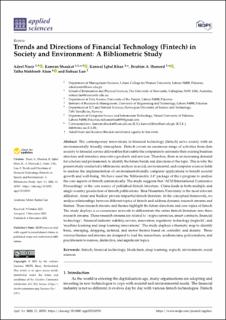| dc.description.abstract | The contemporary innovations in financial technology (fintech) serve society with an environmentally friendly atmosphere. Fintech covers an enormous range of activities from data security to financial service deliverables that enable the companies to automate their existing business structure and introduce innovative products and services. Therefore, there is an increasing demand for scholars and professionals to identify the future trends and directions of the topic. This is why the present study conducted a bibliometric analysis in social, environmental, and computer sciences fields to analyse the implementation of environment-friendly computer applications to benefit societal growth and well-being. We have used the ‘bibliometrix 3.0’ package of the r-program to analyse the core aspects of fintech systematically. The study suggests that ‘ACM International Conference Proceedings’ is the core source of published fintech literature. China leads in both multiple and single country production of fintech publications. Bina Nusantara University is the most relevant affiliation. Arner and Buckley provide impactful fintech literature. In the conceptual framework, we analyse relationships between different topics of fintech and address dynamic research streams and themes. These research streams and themes highlight the future directions and core topics of fintech. The study deploys a co-occurrence network to differentiate the entire fintech literature into three research streams. These research streams are related to ‘cryptocurrencies, smart contracts, financial technology’, ‘financial industry stability, service, innovation, regulatory technology (regtech)’, and ‘machine learning and deep learning innovations’. The study deploys a thematic map to identify basic, emerging, dropping, isolated, and motor themes based on centrality and density. These various themes and streams are designed to lead the researchers, academicians, policymakers, and practitioners to narrow, distinctive, and significant topics. | en_US |

